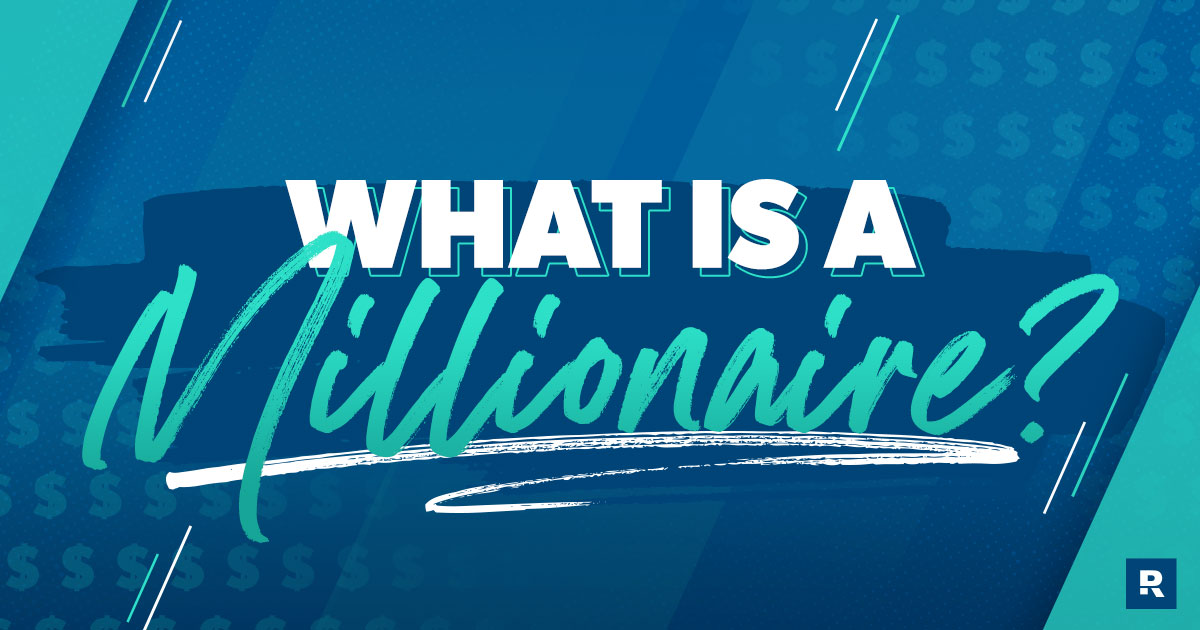
Key Takeaways
- A millionaire is defined by their net worth, not their income. Reaching millionaire status isn't about how much money you make, but about having a net worth (which is what you own minus what you owe) of $1 million or more.
- Becoming a millionaire is an achievable goal for ordinary people. The majority of millionaires in the U.S. did not receive a huge inheritance or win some kind of lottery—they built their wealth through consistent, disciplined financial habits.
- Millionaires often live a frugal lifestyle. Contrary to popular belief, many millionaires are careful with their spending and live below their means, rather than showing off their wealth with luxury items.
- Disciplined financial habits are the key to building wealth. The path to becoming a millionaire involves getting out (and staying out) of debt, investing consistently over a long period of time, and making savings a top priority.
Stop for a second and picture a millionaire. What comes to mind?
Market chaos, inflation, your future—work with a pro to navigate this stuff.
Does your version of a millionaire live in a big house, drive an expensive car, and wear designer clothes? That person could be a real millionaire, but they might not be.
The mortgage lender could own the house, the bank could own the car, and they might have racked up a ton of credit card debt buying the clothes. Lots of people can look like a million bucks without actually having a million bucks, and they could be one step away from losing it all.
People believe all kinds of crazy myths about millionaires. If you asked 10 random people on the street what it means to be a millionaire, you’ll likely get 10 completely different answers. And most of them would be wrong!
So let’s cut through all the junk and get to the true definition of what it means to be a millionaire.
What Is a Millionaire?
A millionaire is somebody with a net worth of at least $1 million. It’s a simple math formula based on your net worth. When what you own (your assets) minus what you owe (your liabilities) equals more than a million dollars, you’re a millionaire. That’s it!
Being a millionaire is not about how much money you make in a year, your feelings or emotions, or your crazy uncle’s opinion. Again, it’s a math formula, and math doesn’t really care about feelings—whether they’re yours or anyone else’s. It all comes down to your net worth.
Let’s say John and Maria have $750,000 in 401(k)s and savings accounts. They also have a house worth $350,000 and own two vehicles worth $10,000 each. Add all that up and their assets total $1.12 million.
But that’s just half the picture. Before we can call them millionaires, we have to look at what kind of debt they have. And would you look at that: They still owe $150,000 on their home, have $10,000 of credit card debt, and owe $20,000 on their student loans. Their liabilities add up to $180,000.
To figure out if they’re millionaires, let’s subtract what they owe from what they own.
What they own: $1,120,000
What they owe: – $180,000
Net worth: $940,000
So John and Maria are not millionaires. They’re really close, but they haven’t hit the mark yet.
But what if they didn’t have any student loan or credit card debt and they knocked their mortgage down to $100,000?
What they own: $1,120,000
What they owe: – $100,000
Net worth: $1,020,000
That’s more like it! Now John and Maria would be considered millionaires. And if they got serious about paying off that mortgage—because you never want to take a mortgage with you into retirement—they could invest and save even more.
How about you? Are you a millionaire? Check out our Net Worth Calculator to find out.
Ramsey’s Complete Guide to Investing
Whether you’re a total beginner or experienced investor, this free guide will teach you what you need to know to invest with confidence.
What Does a Millionaire Look Like?
First of all, don’t make the mistake of confusing millionaires with billionaires. The millionaire lifestyle does not include owning private yachts, driving exotic sports cars, and eating gold-encrusted steak for dinner every night. That’s Hollywood’s mythical version of a millionaire!
Don’t get us wrong. A million dollars is a lot of money, but it’s not as far away as you might think.Look at it this way: $1 million is 1,000 times $1,000. A billion dollars, on the other hand, is 1,000 times $1 million. That means a billionaire has a thousand times more wealth than a millionaire . . . just think about that for a minute! If you have $10,000 in the bank, congratulations: You’re 10 times closer to becoming a millionaire than a millionaire is to reaching billionaire status.
Why are we telling you this? Because we want you to remember that reaching a million-dollar net worth isn’t some impossible, pie-in-the-sky pipe dream. In fact, becoming a millionaire is very doable! After all, there are almost 24 million millionaires in the U.S. today (the most in the world).1
What’s the real life of a millionaire like?
So, we’ve covered what a millionaire is (and isn’t), but what exactly does a real millionaire’s life look like? It probably looks a whole lot like yours does right now! Here are some of the things we learned about millionaires from The National Study of Millionaires:
- Millionaires go to college, but not to elite schools. In fact, almost two-thirds of millionaires (62%) graduated from state schools, while only 8% went to a prestigious private school.
- Most millionaires didn’t get there by betting on risky single-stock investments. Nope! In fact, 8 out of 10 invested in their company’s 401(k). And 75% said that regular, consistent investing over a period of time was the reason for their success.
- Even though they’ve “made it” to millionaire status, they’re still careful about their spending (85% of them shop with grocery lists and 93% of millionaires use coupons).
- Three-quarters of millionaires (75%) spend less than $200 at restaurants each month. Did you think millionaires live on lobster and caviar? Think again!
And that’s just scratching the surface. The more you dig into the lives of millionaires, the more you’ll see that there’s a huge difference between what Americans think a millionaire’s lifestyle looks like and how they actually live their lives.
Keep Boosting Your Investing Know-How
Every two weeks, the Ramsey Investing Newsletter will send you practical insights, easy-to-use resources, and the latest investing news. All explained in plain English.
How Do You Become a Millionaire?
We’d be willing to bet you want to become a real millionaire—someone who actually has $1 million or more in assets and zero debt weighing them down.
Can anyone be a millionaire?
If becoming a millionaire seems impossible, we’ve got some good news for you. Ramsey Solutions conducted the largest study ever done on millionaires, and we found that, for the most part, they’re ordinary folks just like you. In fact, the top five professions of millionaires were accountants, engineers, management, attorneys and teachers!
Here at Ramsey, we believe anyone can build wealth—no matter their background, age or income. And we believe anyone can become a millionaire. Believe it or not, the vast majority of millionaires didn’t inherit their money or win the lottery. That’s just another dumb millionaire myth.
In fact, a whopping 79% of millionaires didn’t receive any inheritance at all. And 8 in 10 grew up in households at or below middle-income level, while only 2% said they came from an upper-income family. Here’s the truth—millionaires are made, not born.
Here are some of the things they did do to achieve millionaire status:
- They stayed far away from debt.
- They invested early and consistently into their 401(k).
- They made savings a top priority.
- They found ways to increase their income.
- They cut out unnecessary expenses from their budget.
- They worked with an investment professional.
Doing these things year after year takes a lot of discipline, but becoming a millionaire is absolutely possible.
Work With an Investment Professional
If you want to learn more about hitting that million-dollar mark, it can pay to sit down with a pro. For help finding one in your area, check out SmartVestor. It’s a free program that’ll connect you with financial advisors who can help you make informed investing decisions, so you can pursue your retirement dreams with more confidence.
Next Steps
- If you haven’t already, pay off debt and stay out of debt. For help, check out the plan that thousands of people have used in their journey: the 7 Baby Steps.
- Once you’re out of debt and have an emergency fund of 3–6 months of expenses saved, you may be ready to invest your money. Check out our Investment Calculator to get an idea of your earning potential.
- Finally, connect with a SmartVestor Pro who can answer your investing questions and help you make informed decisions for your future.
Frequently Asked Questions
-
How do millionaires get rich quick?
-
It might be surprising, but most millionaires don’t get rich quick. In fact, folks who dive into single stocks, crypto, or their friend’s latest rental property flipping scheme looking for a quick and easy way to make bank usually only end up with more heartbreak and less money in their pocket.
So how do millionaires build their net worth? The answer is actually quite boring, but with consistency and patience, it works! The number one contributing factor to millionaires’ high net worth was investing consistently in their retirement plans over a long period of time.11 That’s right! Most millionaires used their 401(k) and IRA to build their wealth.
It’s not flashy or fancy, but it’s tried and true—if you invest 15% of your gross income into tax-advantaged accounts over 25, 30 or 40 years, you will become a millionaire!
-
Don’t most millionaires live lavish lifestyles?
-
We’ll let you in on a little secret . . . just because someone looks like they’re a millionaire doesn’t mean they are. Sorry to burst your bubble, but most millionaires look more like your unassuming next-door neighbor than the celebrities and athletes you see on TV.
In fact, we found that the top three car brands millionaires drive aren’t even luxury brands. According to The National Study of Millionaires, the two most popular makes of cars among millionaires were Toyota and Honda, with nearly one third of them (31%) driving one of those brands.
Do millionaires spend their money on exclusive brands and dining out on steak and caviar? Nope. The millionaires in our study said they spend an average of $117 per month on clothes and less than $200 each month at restaurants.12 That’s some cheap caviar.
See, becoming a millionaire is all about how you behave with your money, not about keeping up with the Joneses. If you want to build wealth and become a Baby Steps Millionaire, stop caring about what other people think about your clothes, your car or your house. Keep your eyes on the prize. Live like no one else so that later you can live and give like no one else.
This article provides general guidelines about investing topics. Your situation may be unique. To discuss a plan for your situation, connect with a SmartVestor Pro. Ramsey Solutions is a paid, non-client promoter of participating Pros.



